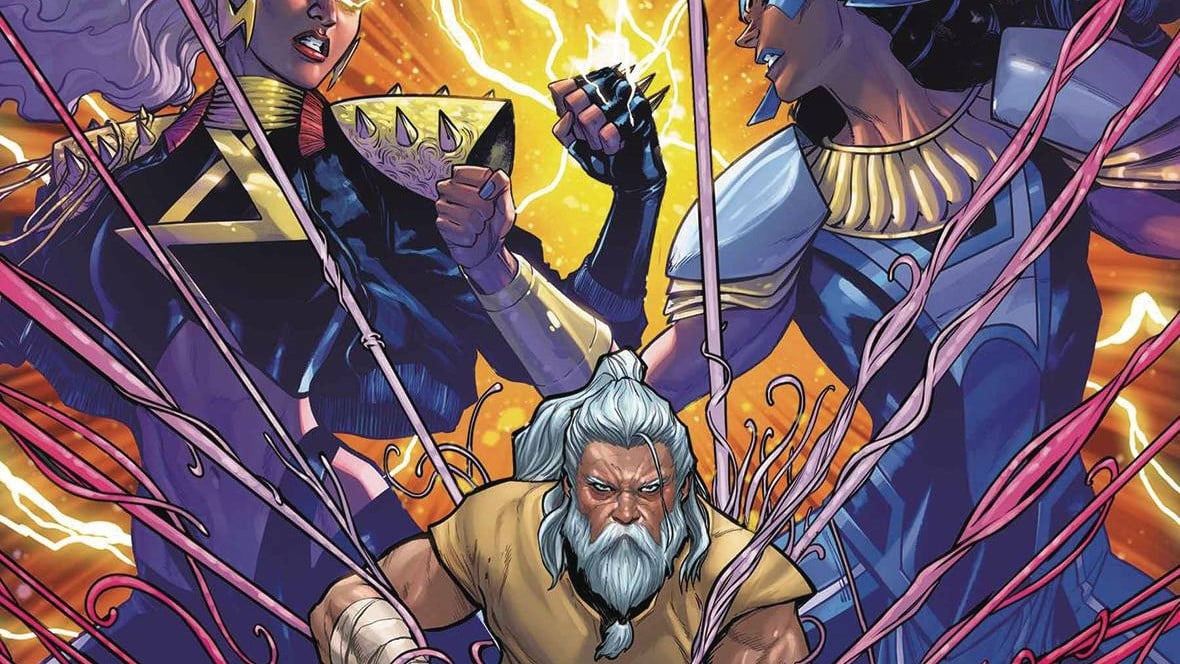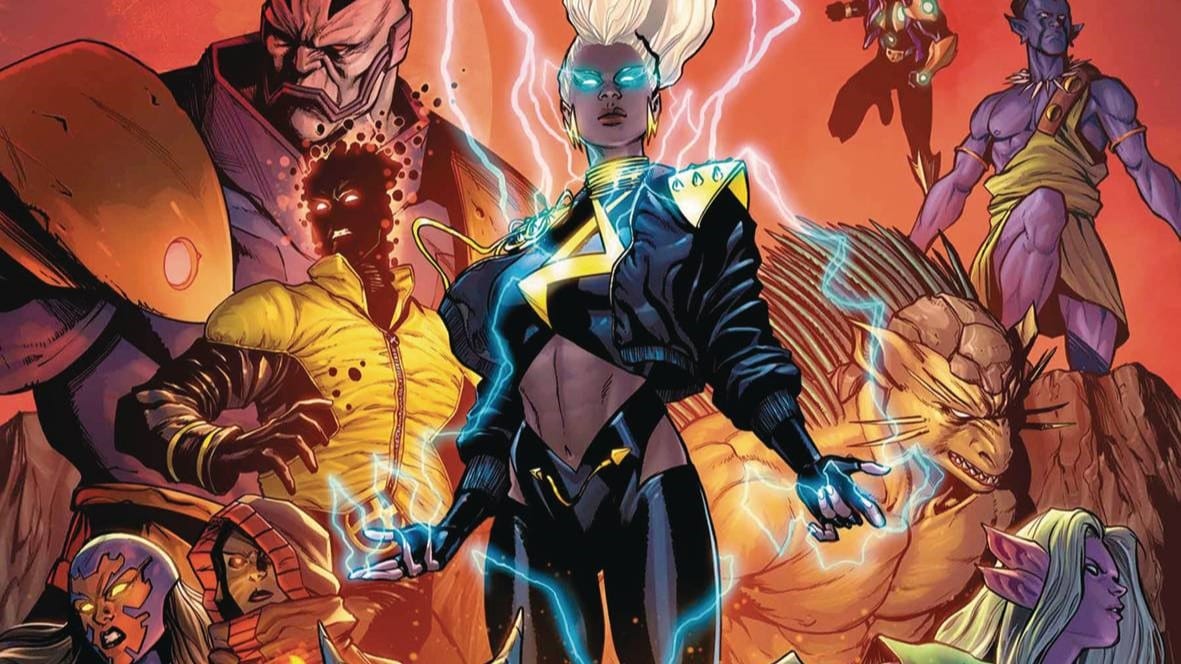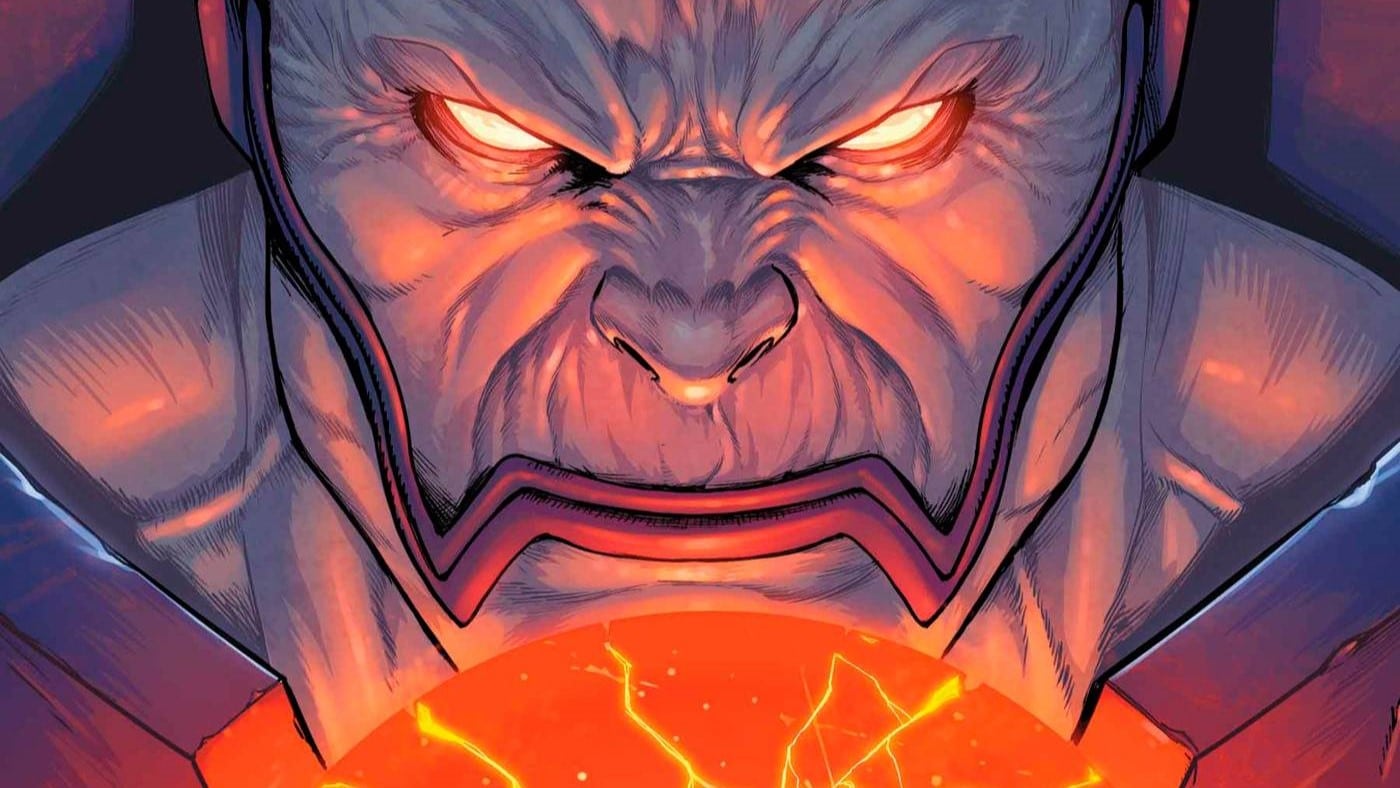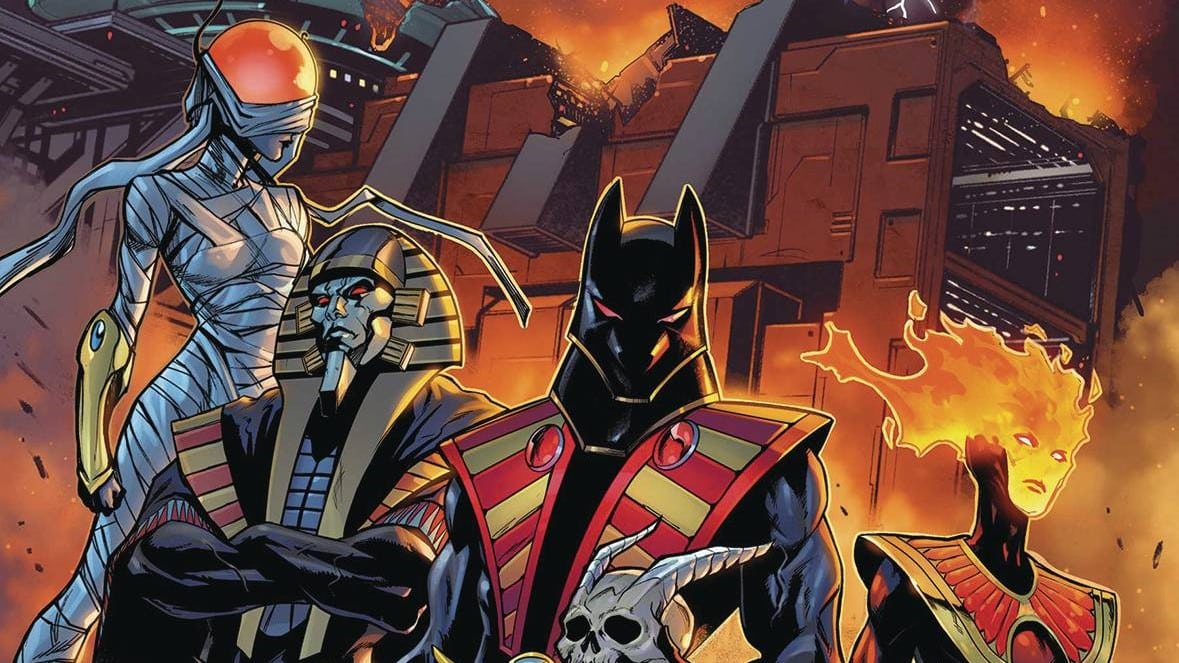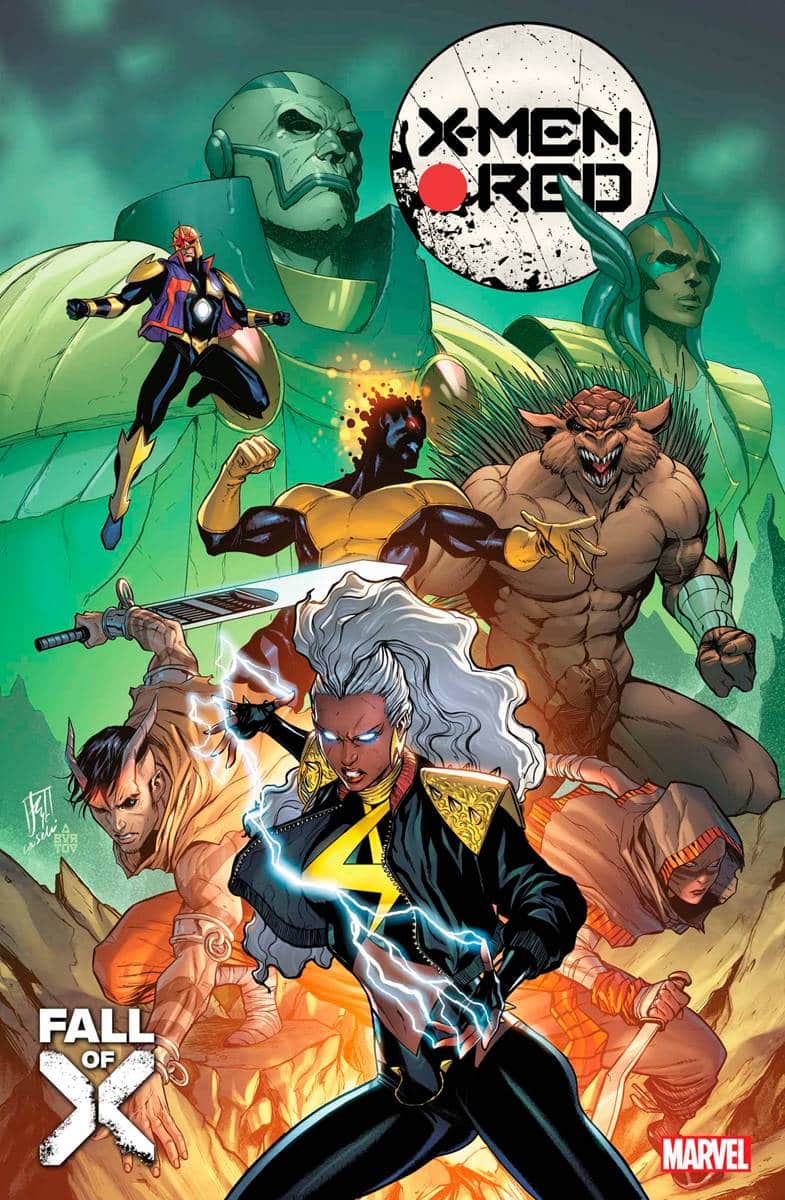It’s the power of nothing versus the hordes of Genesis & Annihilation in X-Men Red #15 written by Al Ewing, art by Yildiray Cinar, colors by Federico Blee, and letters by Ariana Maher.
Think about your first memory: the clarity, the circumstances, the people. Do you smile when you think of it? Recoil in embarrassment or pain? Have you shared that memory with anyone?
Do you think it’s worth sharing?
My first memory is one of benign violence. On my last day in preschool, playing musical chairs, I booty-bumped someone from the chair, winning by default — maybe undeservedly, but winning nonetheless. I walked outside to both of my parents waiting for me on what I’m pretty sure was a sunny day. My father picked me up and placed me in the back of his brown Jeep Wrangler, my mother riding shotgun.
I remember being happy. Content.
Safe.
The Fisher King, our protagonist and point of view for X-Men Red #15, has memories from childhood too. Memories that don’t cover him in contentment or joy.
Memories notable for their absence of safety.
This idea — that memory is sacred and that memory saves — has been central to Arakkii society. They remember pain and shun those who don’t share the memory. Thus remembering pain is central to becoming a respected part of society.
The Fisher King — now merged with Xilo, the living memory of the people, decimated in body and thus purpose — is reconciling his personal history, his pain, with that of his people in an attempt to help save the people.
Thus we delve into the memory of Fisher King, fleshing out his history and (lack of?) powers, juxtaposing that history with the current troubles of his Brotherhood.
Memories don’t live like people do / They always come back to you
The Fisher King’s lack of history and power made his motivations feel nebulous, even as they’ve generally been beneficial to the Brotherhood. Here, finally, flashbacks flesh out his story. The Fisher King calls himself the “omega of nothing”, as if to imply he has no power. This is true in a sense — he cannot summon lightning, or shapeshift or change the magnetic poles of the planet. His power is, quite literally, being nothing. Being a nobody. Being unseen, undetectable, even by malignant mind-readers or an imprisoned “mind ripper” who’s inadvertent power drove all others who delivered him food and pity mad.
But not the Fisher King, you see. Not even as a child. Because he’s always been a nobody.
This idea — that being unseen is beneficial in Arrakko — dovetails with the idea that being an unseen mutant on Earth can be a dangerous detriment. Just look at the hundreds of unseen, unknown mutants rounded up by Orchis and experimented on in Victor LaValles’s Sabretooth series. There, invisibility hurts. Here, in this funhouse mirror version of Krakoa, there is safety in the shadows — safety to mourn, to smile, to plot.
Safety to plan vengeance and murder, as the Fisher King did, only to be stopped by his eventual life partner Zsora.
Zsora, who’s eyes burn like her daughter’s heart, sees the truth behind lies (or at least that’s what i’m assuming based on her frustration at not being able to read the motivations of Annihilation, implying that she can read others easily). Along with her sister, Syzya (the Nightcrawler-esque transporter who leaves behind a smell of Jasmine instead of Brimstone), and the Fisher King, Zsora became the Night Seat — fighting against the forces of Genesis and Annihilation in quiet, striking small, maybe insignificant wins. Maybe less effective at creating change, but likely very effective at keeping hope alive.
For 30 years, keeping hope alive.
Upon visiting the lothario Solem, for whom they provide favors in return for a safe place to congregate, they plan to make a definitive strike on the ruling junta. Notably, Solem seems, well, uncharacteristically solemn about this action, perhaps betraying a knowledge of the eventual failure of their endeavor, noting that his skin and heart are impenetrable, but others aren’t — both alluding to the literal means of defeat and the emotional weight of said defeat.
And defeated they were.
Genesis is the master of plant-life, so of course one who controls roots would not allow, could not allow, hope to take root. She controls flora, even spores that lie in the gut, always present, waiting, listening, learning,
Betraying.
The coup fails; the Fisher’s wife burns; their children watch (explaining Weaponless Zen’s dismissal of her father), hope seemingly dies.
But the memory remains.
All I do / Is think About you
Unfortunately, though retained, the memory isn’t recalled quick enough. For while Fisher King has been searching his memory and feelings, fighting has been going on. The fighting with Genesis’ forces has reached a stalemate, forcing her forces to use a sea route to finally make headway. The Fisher King prepares the Brotherhood for this as best he can.
Unfortunately, his best isn’t enough.
He correctly assumes that Genesis doesn’t have the full control of Sobunar’s forces. In fact, it’s increasingly clear that Genesis doesn’t have control at all — Annihilation does. The staff’s one word whisper controls the actions of all, including she who so confidently wields the helm.
But not Sobunar — not completely. He still resists, in a passive, but firm way, the use of the ocean to advance the war. He still seems to hold on to the idea that the Arakki are one people, and one people do not need to war amongst themselves.
A passive idea, and an increasingly minority one.
Everyone else itches to proceed (again, maybe with some Anihiliation-led motivation), with Sobunar’s blessing or not, until Ora Serrata says that no, the challenge isn’t just to the people, but to the planet as a whole — in body and in spirit. (Note how law is made up in the moment, on the fly, to propagate whatever feelings are in the air.) Thus she empowers Satis Exotica — a newly seen Arakki mutant — to use his gift of advancing evolution by blood to create a Godzilla-like Kaiju Fish to lead the attack against the Brotherhood.
Storm (who’s been little more than a witness up until this point), acts definitively, creating a giant icepick, quickly incapacitating the monster with one blow before it causes any damage.
This grand moment deserved better art — as does most of the book. The illustration lacks the grandeur or uniqueness to effectively communicate the intended impact of these actions. Everything is just fine enough, sure. But the colors are incredibly muted, the art relatively subdued. Thus, while the moment is great, indeed, it lacks oomf.
But, at least Bobby has brown skin. Small wins, we’ll take ‘em.
Regardless, when Xilo’s tingling worms finally catch up with the Fisher’s memories, we see that the same spores that betrayed the Fisher King lie in the stomach of the defeated beast An Okkara gate — a gate that needs blood to be opened — has taken root in the beast’s corpse, creating a Trojan horse from which the full might of Amenth — including it’s hordes, the previously unseen Horseman Death, and brainwashed White Sword with his reincarnated armies — can pour.
The final fighters have appeared at the front door of the resistance — and it’s not clear that the resistance has the means, heart, or memories to survive.
It’s been a long time/I shouldnt’ve left you/without a strong rhyme to step to
I have another memory — a memory of the first comic I ever read. It was maybe 1987-ish. I know it was a Transformers comic. I know Shockwave was a focal point. I know I poured and poured over that single issue for months on end. I know it’s still somewhere, in some box locked away with other memories too random to immediately recall.
I guess the Fisher King and I do have a bit in common.
To say I like this comic book, yet again, feels like a broken record. Of course I do. It’s telling an intriguing, engaging, episodic story, deftly aware of the implications of its actions, both in the comic and in how it’s readers will perceive and relate to them.
This is good work.
And yet.
If I was just picking up this book by happenstance — if I was wandering in the comic book store for the first time, like I did ages ago -— like we all did at one point — would I pick this up? Would this engage and interest me? Would the art catch my eye? Would the story be perceptible to me as a novice?
Or would I — could I — enjoy the issue for what it is, as it is, and have that be enough?
I’m not so sure. Of course, any serialized media, after enough episodes, can become impenetrable to new readers. This is why comics have to reboot every few years; this logic explains why comic characters, especially the most popular ones, almost always regress to some general mean upon these reboots.
X-Men Red, then, is both a gift and a curse. A worthy addition to an increasingly interesting lore, and yet another addition an almost impenetrable wall over which many new comic fans will not be able to clear.
Does this matter? Should we care? Shouldn’t the story be enough?
I don’t have the answers.
But I do have a memory — a memory of joy, a memory of intrigue, a memory that’s led me to a place where I can read and write about things that give me joy, even in times when joy would otherwise be in short order.
I only hope that this issue can do the same for someone else.
(Dedicated to the memory of my recently deceased blood brother, Roderick Michael Thorns, the first person who taught me to dream bigger and better. May your memory burn bright, forever.)
A proud New Orleanian living in the District of Columbia, Jude Jones is a professional thinker, amateur photographer, burgeoning runner and lover of Black culture, love and life. Magneto and Cyclops (and Killmonger) were right. Learn more about Jude at SaintJudeJones.com.

